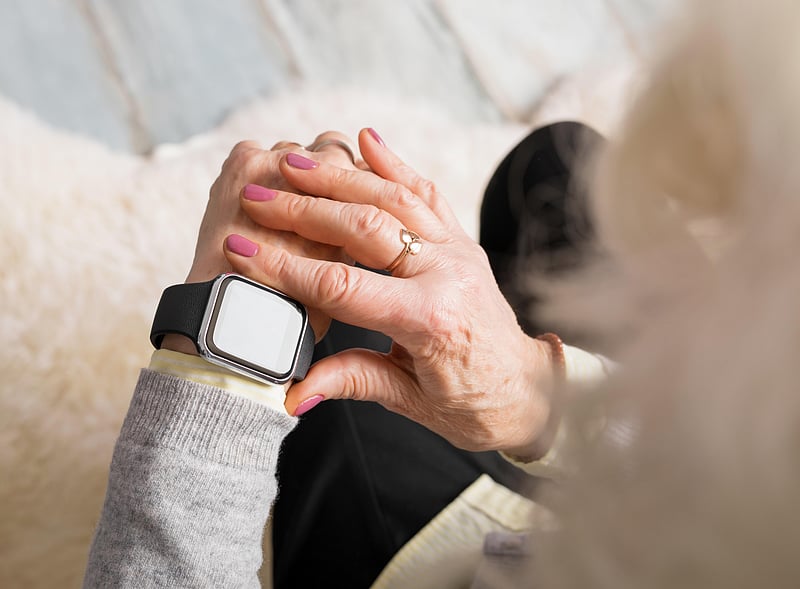Please call us to schedule your appointment or if you need us to help you decide which vaccinations you need.
(315) 848-3784
NEW! Access your prescriptions online. Click
Manténgase sano!

- Dennis Thompson
- Posted August 30, 2022
With Smartwatch, Cardiac Rehab at Home May Work Best
A new smartwatch could be a key player in preventing heart attacks among people suffering from risky heart conditions, a new study claims.
Using the smartwatch to track their heart health, patients in a home-based cardiac rehab program were more than 20% less likely to land in the hospital than patients trekking to a medical facility several times a week for their rehab, researchers found.
Patients armed with the smartwatch were also more likely to follow through on their exercise program, which was tailored to their lifestyles based on the data feed from their device, said lead researcher Dr. Chileshe Nkonde-Price, a cardiologist at the Kaiser Permanente West Los Angeles Medical Center.
"We showed that home-based digital virtual cardiac rehab was better than center-based rehab. That's the first time it's been shown,"Nkonde-Price said. She added that it's the largest group ever studied in a head-to-head comparison of the two types of cardiac rehab.
A standard eight-week cardiac rehabilitation program of exercise, medication and health education has been proven to protect at-risk patients from suffering a heart attack.
Such programs are usually prescribed to people who've suffered a heart attack, had a stent placed into a clogged artery, or undergone open heart surgery, Nkonde-Price said.
Unfortunately, more than 80% of heart patients eligible for cardiac rehab in the United States don't bother participating in such a program, leaving them at risk for re-hospitalization, researchers noted in background notes.
For this study, researchers tracked more than 2,500 patients who participated in cardiac rehabilitation between April 2018 and April 2019.
Patients were given the option of participating in standard rehab at a hospital or clinic, or trying home-based rehab.
More than 1,240 chose home-based rehab. Those folks were given a smartwatch that monitored their heart rate and recorded their exercise activities, feeding all that data back to their health care professionals through a smartphone app, Nkonde-Price said.
Each of the eight weeks, the home-based rehab participants were given an exercise "prescription"to follow.
"That prescription might say, exercise for 30 minutes and try to get your heart rate up to an individualized level, and please do that three or four times a week,"Nkonde-Price explained.
Patients also received a weekly health education phone call, and the smartphone provided reminders about when to take their meds.
The center-based rehab group traveled to the hospital or clinic three times a week, where they participated in supervised exercise and were provided health education during their visit.
The main goal was to prevent hospitalizations, and researchers found that the home-based cardiac rehab group had a 21% lower chance of being hospitalized in the year following their program, Nkonde-Price said.
Both groups had similar medication adherence, blood pressure control, "bad"cholesterol levels, and blood sugar.
The advantage of home-based rehab is that it can happen anywhere, Nkonde-Price said. A person might choose to get their exercise minutes in and their heart rate up by climbing some stairs, taking their dog on a neighborhood stroll, or riding their bike to the market.
As it turned out, people were more likely to get all the exercise required by the program if they did it from home, Nkonde-Price said.
Further, the smartwatch data gave heart doctors and nurses a more complete picture of each patient's cardiac health than what is obtained during a thrice-weekly rehab session, Nkonde-Price added.
"We're delivering a personal, individualized touch with, in my opinion, higher supervision, even though we're not seeing it"in person, Nkonde-Price said. "I think it's the future. I really do."
The findings were published online Aug. 25 in JAMA Network Open.
The new study provides support for "more research that home-based cardiac rehab can be useful for patients,"said Dr. John Osborne, a cardiologist in Southlake, Texas. "We certainly didn't see any evidence to suggest any harm with it."
However, the study is flawed because people could choose between the two cardiac rehab programs, Osborne noted. People who participated in home-based rehab typically lived farther away from the nearest center.
The people who chose home-based rehab also tended to be younger and slightly healthier, with lower rates of high blood pressure, high cholesterol and diabetes, Osborne noted.
And while the home-based rehab people had a lower rate of overall hospitalizations, their rate of hospitalization specifically for heart-related problems was not significantly different, Osborne added.
"It makes you wonder, if there's no difference in cardiovascular hospitalizations and there is a difference in total hospitalizations, then what were the factors that played a role there?"Osborne said.
More information
The American Heart Association has more about cardiac rehabilitation.
SOURCES: Chileshe Nkonde-Price, MD, cardiologist, Kaiser Permanente West Los Angeles Medical Center; John Osborne, MD, cardiologist, Southlake, Texas; JAMA Network Open, Aug. 25, 2022, online







